11+ Sample Character WitnessStatements
-
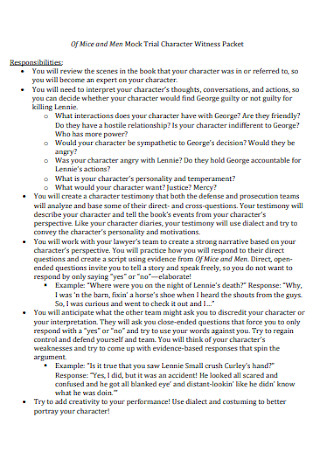
Men Mock Trial Character Witness Packet Template
download now -
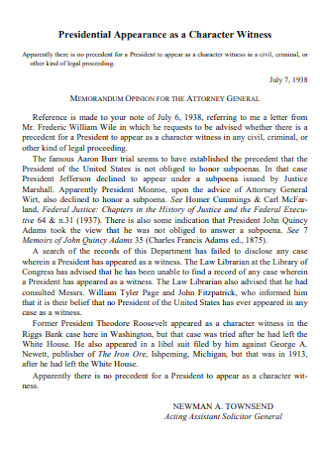
Presidential Appearance as a Character Witness
download now -
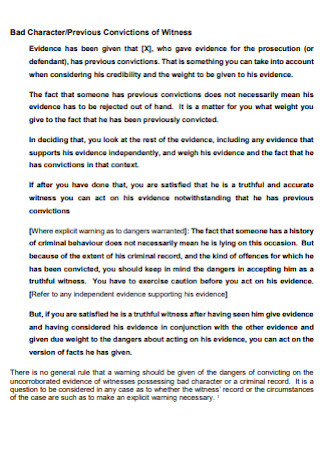
Bad Character Witness Template
download now -
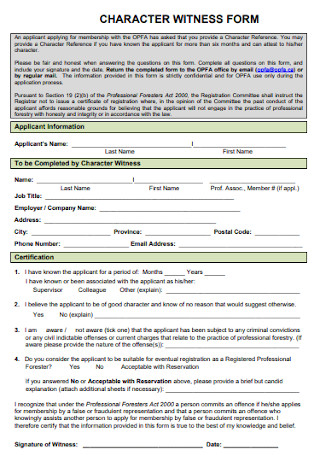
Character Witness Form Template
download now -
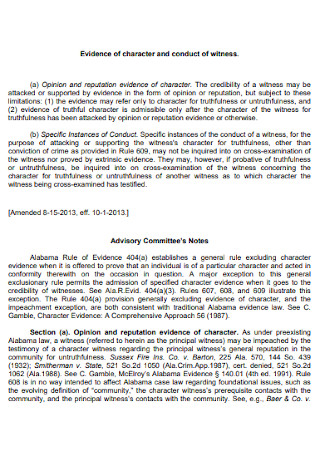
Evidence of Character and Conduct of Witness
download now -
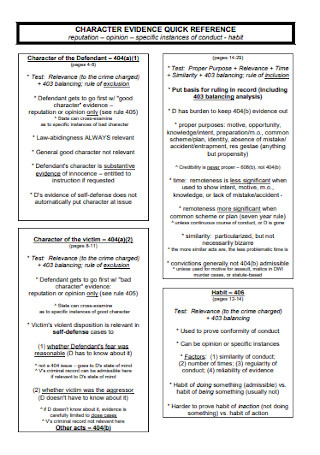
Character Evidence Quick Reference Template
download now -
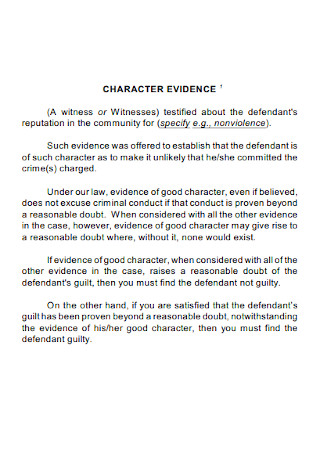
Basic Character Witness Template
download now -
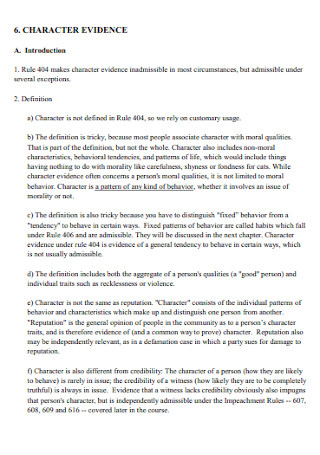
Standard Character Evidence Template
download now -
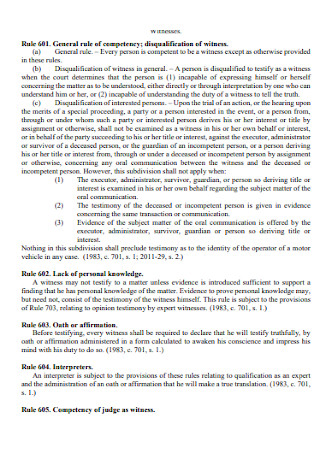
General Character Witnesses Template
download now -
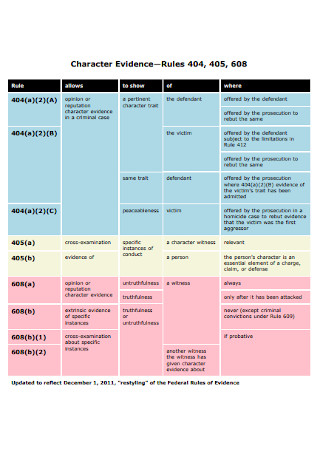
Character Evidence Chart
download now -
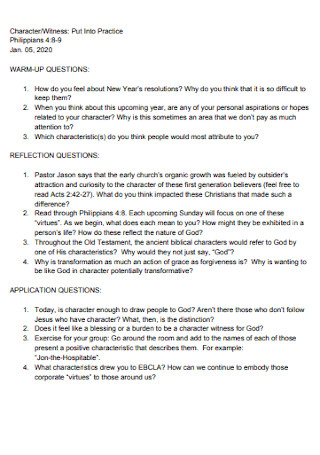
Formal Character Witness Template
download now -
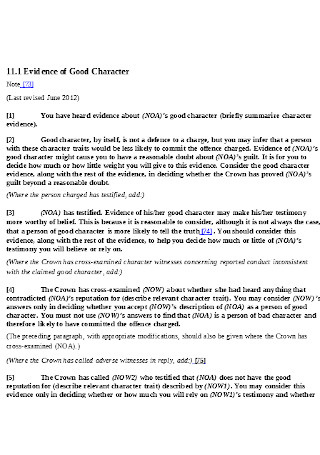
Good Character Witness Template
download now
FREE Character Witness Statement s to Download
11+ Sample Character WitnessStatements
What Is a Character Witness?
Benefits of Witness Statements
Types of Good Character Traits
Tips for an Effective Character Letter
How to Write a Character Reference Letter
FAQs
What are character witnesses?
Should I write a character statement?
Who talks to The Witness?
What Is a Character Witness?
In criminal cases and occasionally in civil cases, character witnesses are the most frequent type of witness. Character witnesses are what sound like eyewitnesses to a person’s character. They can testify to either positive or negative character reference for court and are frequently utilized by both the plaintiff and defendant. The character witness may only testify about the individual’s reputation or about specific instances of misconduct. The character witness is also permitted to state their opinion of the defendant, but they cannot be questioned if their opinion would change if the defendant were found guilty. Likewise, character witnesses are subject to cross-examination. If the defendant testifies, the character witness proves or disproves the credibility of the defendant’s statements.
Benefits of Witness Statements
Witness statements have replaced traditional direct examination of a witness in court proceedings and other common law jurisdictions. The purpose of this new practice was to shorten the duration of the evidentiary hearing by preventing counsel from moving slowly from one fact to another to avoid top queries. Also, it permits the litigant who intends to use such evidence to peruse it before hearing the witness. In addition, the witness statements enable the litigant to better prepare for the cross-examination. The witness statement, which will be confirmed through direct examination, serves as the premise for cross-examination and, if necessary, re-examination. Even though crafting a witness statement takes time, it allows for much more thorough preparation for the witness’s cross-examination.
Types of Good Character Traits
Professionals of high moral integrity foster a positive work environment. When employees behave professionally and assist one another, they can instill confidence in the organization and motivate others to be more optimistic. The characteristics that define excellent character may vary depending on the workplace and the individual. Professionals may also identify areas for improvement and acquire new skills development plans to complement their existing ones. Here are some positive characteristics and their professional applications:
Tips for an Effective Character Letter
A character reference letter is intended to demonstrate support for a criminal defendant. These letters can potentially sway the court and affect the final sentence in a criminal case. For this reason, character letters should be meticulously composed to maximize their usefulness. First and foremost, individuals containing character letters should establish their credibility as a reference for the defendant. Next, the letter should describe the defendant to help the judge comprehend them beyond the crime committed. The letter should also be respectful and not undermine the defendant’s case. Following are guidelines for composing a persuasive character letter. A strong character letter can immensely benefit a defendant’s case. Writing such a letter can be difficult, especially for those unfamiliar with the criminal justice system. Learn how to compose a top-notch letter of support by reading on.
1. Setting the Stage
A character letter should initially only originate from people who know the defendant. Form letters of character are not persuasive. Instead, each writer should begin their character letter by describing how long they have learned about the defendant and how well they know him. If the person understands the defendant professionally, this can be explained in the introductory paragraph.
2. Narrate a Story
The primary purpose of a character message is to relate a story about the defendant. Consider what makes your acquaintance, relative, or coworker more than just a “defendant” and how you can convey this to the court. This may influence the judge’s decision and result in a more favorable sentence for your loved one. Avoid describing the defendant simply, such as “he is loyal.” Instead, tell a story about his loyalty or how he has been a model community member. A story will be more memorable to the adjudicator than adjectives, making your letter more effective.
3. Avoid Weakening the Argument
It is often alluring for a person writing a character letter to argue that the defendant is not truly guilty, that this “isn’t like him,” that the defendant only pleaded guilty to the crime to receive a lighter sentence, or that the jury made a mistake. This action will not benefit the defendant and may even harm his case. Instead, emphasize a narrative about the defendant, as described above. Thus, you can demonstrate reverence for the criminal justice system while convincing the court that your loved one deserves a reduced sentence.
4. Concerns Related to Formatting
Generally, the letters should be typed on standard paper measuring 8.5 by 11 inches. Remember that the purpose of your letter is to get the court to read it, so the simpler you make it to read, the better. The only exception is if a minor wrote the letter. In such circumstances, a handwritten letter may be more persuasive. Your name, mailing address, phone number, and email address should be included in character letters so the court can verify your identity. Although you may have the case number on the letter, it is unnecessary because the attorney will submit it.
5. Recognize a Realistic Outcome
Most character letters conclude with a “ask” to the court. This can be as straightforward as requesting leniency based on the defendant’s exemplary past. In certain instances, however, a letter writer may request a particular sentence. If you intend to make a specific “ask” after your letter, ensure you know the potential penalties for the offense. Some have mandatory minimums for certain crimes, such as repeat felony offenders. You should consult the attorney before requesting a particular punishment to maintain your writing credibility.
How to Write a Character Reference Letter
A character reference letter is a testimonial written by someone who has witnessed the applicant’s moral fortitude firsthand. It is not a professional letter of reference. A character reference letter does not emphasize the applicant’s work experience, professional abilities, or academic background. Instead, it should highlight the applicant’s personal qualities, such as work ethic, integrity, and dependability. Consider the following guidelines if you are requested to write a character reference letter for a companion.
1. Ensure Your Eligibility
You should feel comfortable with your relationship with the applicant before committing to writing the letter. It would help if you were well acquainted with them to be regarded as an authority on their character. Depending on the nature of your friendship with your friend, you will be more qualified to speak on some topics than others. If you and the candidate have been friends, you may talk about how their character has evolved and grown. If you and your friend work together, you can discuss when your friend’s moral integrity was tested.
2. Know Your Audience
Ask your friend if they intend to send this letter to a specific employer or if they will include it with all of their job application form. Knowing your audience lets you personalize your letter like a resume. For instance, if your acquaintance is applying for a position as a teacher, you could describe their kindness, patience, and approachability. If they apply to medical school, you could highlight their work ethic, moral values, and positive outlook. If the letter is intended for widespread distribution, you may include a variety of comments applicable to numerous industries and job disciplines.
3. Be Honest
Remaining positive and objective is one of the most challenging aspects of writing character references. Your primary purpose in writing is to recommend your acquaintance as an individual with admirable qualities. However, you do not wish to create a false impression of your friend with the employer. It may be tempting to write a glowing recommendation that portrays your friend as the ideal candidate, but excessive exaggeration can harm their chances in the long run. Recalling specific instances in which you observed particular aspects of your friend’s personality can be beneficial to ensure honesty. If you can briefly describe a story that illustrates their openness, generosity, or altruism, the employer may be more inclined to concur with your character feedback evaluation.
4. Make Your Letter Readable
Most likely, the recruiting managers who will read your letter have already read dozens of character reference letters, so they are adept at scanning letters for the required information. Your letter should be concise and well-structured to convey your message and maintain the reader’s interest. Dense verbiage, informal language, and repetitive sentences harm a letter of character reference. Keep your paragraphs concise, informative, and focused. If your cover letter is simple and enjoyable to read, the hiring manager is likelier to appreciate and remember it.
FAQs
What are character witnesses?
Character witnesses can attest to another’s positive or negative character traits and reputation within the community. Such character evidence is frequently admissible in court. Its use in civil cases is restricted.
Should I write a character statement?
The character reference letter is essential because it gives the employer insight into the candidate’s personality outside their professional qualifications. An employer may ask for a character reference letter to learn more about the applicant’s personality.
Who talks to The Witness?
The prosecutor must become familiar with the crime’s details, interview the witnesses, examine the evidence, anticipate potential problems during the trial, and formulate a trial strategy.
If you are composing a character reference for a friend for the first time, you can start by consulting templates and samples to help you set the appropriate tone for your letter. Are you prepared to compose your reference letter? Read and consider the advice above!
